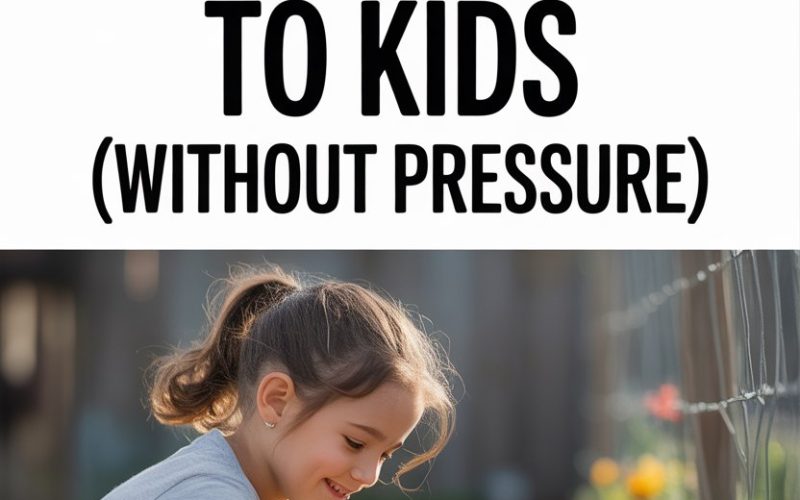Ever watched a seven-year-old tidy her room with the focus of a neurosurgeon—then completely lose steam when asked to pick up a sock? Instilling work ethic in kids is a bit like coaxing a cat into a jumper: possible, but not always straightforward.
And that’s before we add “without pressure” to the mix. Still, fostering motivation and perseverance is doable (even for time‑starved parents who haven’t had a hot cuppa since 2019).
Here’s how to nurture a healthy work ethic in kids—without anyone needing therapy afterward.
Start with Your Own Habits
Nothing makes a lesson stick quite like seeing it in action. Kids watch us like little CCTV cameras, catching every muttered complaint about work emails or every triumphant “done!” after mowing the lawn.
Researchers have found that modelling behaviour is one of the strongest predictors of children’s future habits.
Now, this doesn’t mean you need to fake enthusiasm for matching tiny socks every morning. But narrating your process (“Ugh, this is a drag, but it feels good to finish what I start!”) normalises effort and persistence—not perfection or martyrdom.
Make Chores a Family Affair
Handing a six‑year‑old a mop and expecting a sparkling floor is a recipe for heartbreak. But pitching in together, with everyone tackling age‑appropriate jobs, teaches that effort is both valued and shared.
The University of Minnesota’s Child Development Institute points out that children who participate in family chores show better self‑esteem and responsibility later on.
Pop on some tunes, race to beat the timer, or just moan together about the monumental injustice of crumbs. Suddenly, tidying up morphs from punishment into a team effort.
Celebrate Effort, Not Just Achievement
Show me a parent who hasn’t gritted their teeth through a lopsided crayon drawing presented as a masterpiece. Here’s a secret: kids care just as much about how you respond to their effort as to their results.
Praising effort (“You worked hard on that tower—it took real patience!”) instead of just the final product helps foster a growth mindset.
Psychologist Carol Dweck’s research shows this kind of feedback builds grit and resilience, rather than fear of failing.
Bonus: it makes “trying” rather than “winning” the family sport. The gold medal is nice, of course, but the real prize is refusing to quit—even after the LEGO castle topples for the third time.
Keep Expectations Clear and Realistic
Vague requests like “clean your room” can confuse kids and lead to disappointment for everyone (except perhaps the dust bunnies, who thrive on ambiguity). Clear, specific instructions minimise power struggles and set everyone up for success.
A checklist—even scribbled on a post‑it—gives children a concrete map to follow: shoes in the basket, books on the shelf, stuffies on the bed. Once they know exactly what effort looks like, they can learn to replicate it.
Consistency is key, as is resisting the urge to sweep in and “fix” things because it’s faster. If you wanted it done quickly, you’d have done it yourself, right?
Embrace Mistakes and Low Stakes “Failures”
Ever seen a child attempt to pour milk, only for the Great Flood to descend upon your kitchen? Mistakes are part of the process. Kids need room to muck things up and try again.
Allowing small failures (spilled milk, a forgotten spelling word, a burnt pancake) signals that it’s safe to put in effort—even when the outcome isn’t perfect.
Experts at Harvard’s Center on the Developing Child suggest that supporting children through manageable stumbles helps them build resilience and perseverance.
Bonus: modelling how to mop up a spill or laugh off a wobbly pancake teaches that errors are just pit‑stops on the road to mastery.
Link Work to Meaning, Not Just Rewards
It’s tempting to dangle a pound coin or a screen‑time token for every completed task. Short term, this works (who among us wouldn’t scrub the loo for the promise of uninterrupted Netflix?).
Long term, though, it risks turning every chore or effort into a negotiation.
Kids are more likely to develop intrinsic motivation when they understand why the effort matters. “We tidy our toys so we can find them tomorrow.” “We help set the table because it makes dinner together nicer.”
Over time, the task becomes less about a bribe and more about contributing to something bigger than themselves.
Let Kids Take Ownership (Even When It’s Messy)
There’s nothing like the chaos of a child “organising” their bookshelf to test a parent’s resolve. Giving kids real, meaningful choices about their responsibilities makes them more likely to engage fully.
Maybe they decide when to feed the fish or what order to tackle their after‑school tasks.
Sure, the result won’t always be Pinterest‑ready. Still, the sense of control fosters pride and accountability. Kids need to feel the result is theirs, not just another thing “mum made me do.”
Encourage Perseverance with a Wink and a Smile
Marathon runners don’t sprint the whole way. Sometimes, neither do kids. Progress might be slow, lumpy, or punctuated by dramatic groans.
Responding with humour (“That’s the third time the socks have escaped the laundry basket—should I call animal control?”) lightens the mood and keeps effort from feeling like punishment.
Cheeky encouragement works wonders: “Bet you can’t beat your record for setting the table!” or “Let’s see if you can teach me how you made your bed look so tidy.” Suddenly, effort is a challenge, not a chore.
Make Space for Downtime
All work and no play makes for very cranky children (and even crankier parents). The ability to recharge is as vital as perseverance. Scheduled downtime signals to your child that effort is important, but so is rest.
Psychologists have found that kids who experience balanced routines—with time to play, relax, and switch off—are actually more likely to persist and take initiative when needed.
And yes, that includes time to stare at the ceiling, build an elaborate LEGO fortress, or just have a good old moan about how “life is hard” when you’re seven.
Ask (and Listen), Don’t Just Tell
Family conversations about work ethic shouldn’t be one‑sided lectures. Ask your child what jobs they find hard, what helps them stick with a tough task, or even what would make chores feel less miserable.
Their answers might surprise you (“Can the cat do some chores?”).
Listening shows respect for their perspective, and you might glean helpful clues about what motivates them. Maybe they hate folding laundry but don’t mind watering the plants.
Tailoring responsibility to their strengths keeps everyone happier—and teaches that work can be a conversation, not a dictate.
Everyday Moments Count
Teaching work ethic isn’t about grand gestures or perfectly choreographed routines. It’s in the small things—cheering effort, laughing off kitchen disasters, and celebrating “done” (even if it’s not Instagram‑worthy).
The best lessons stick when delivered with a pinch of patience, a dash of humour, and a willingness to muddle through together.
Stuck for ideas tonight? Announce a five‑minute family tidy‑up, race to see who can find the most socks, or simply tell your child you noticed how hard they tried, even if the result was a bit… abstract.
Raising Gritty Kids, One Mess at a Time
Work ethic doesn’t bloom overnight, and it rarely looks Pinterest‑perfect. Kids learn to try, fail, and try again by watching us, doing a bit more each time, and hearing that effort counts for something.
So, next time your child groans at the sight of the laundry pile, remember: it’s all part of the process. And if you manage to sneak in a hot cuppa while they’re at it? Well, that’s just good parenting.




